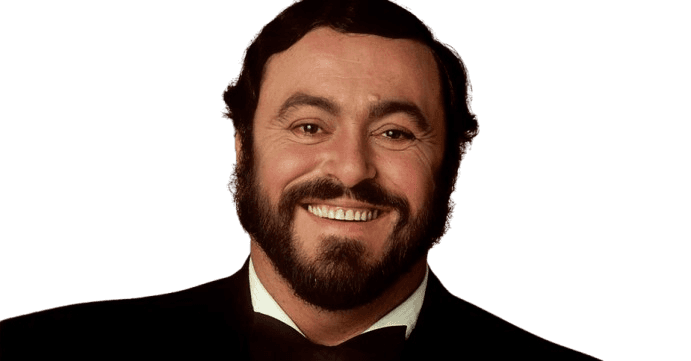Life and achievements
Early life
Pavarotti was born on October 12, 1935, in Modena, Italy, to a middle-class family of peasants. His father, Fernando Pavarotti, used to be a baker and a singer at the same time while his mother, Adele, was working at a cigar factory. However, money was tight; yet music was always an essential aspect of the Pavarotti family. Young Pavarotti's father had a significant influence on him, especially in the songs of tenors Beniamino Gigli and Enrico Caruso. At nine, Luciano joined the church choir, where he sang with his father, and this was when he developed an interest in singing.
In his childhood and while attending school, Pavarotti was involved in football and even considered becoming a professional goalkeeper. But he had another dream, and his mother insisted he enter a more stable occupation, so he became a school teacher. He tried to become a teacher briefly, but the passion for music did not leave him. Pavarotti started vocal studies in 1954 under Arrigo Pola, a well-known tenor from Modena who tutored the young singer free of cost. When Pavarotti's singing ability developed, he remained under the tutelage of Ettore Campogalliani, and during this phase of learning, he worked to earn a living. He was born with the necessary voice and the passion which led him to become one of the greatest tenors in the world.
Legacy
There is no doubt that Luciano Pavarotti is one of the greatest opera singers in history. Pavarotti was famous for his powerful voice and high Cs; He became one of the most renowned musicians of the twentieth century. He was admired not only by people who were lovers of the opera. His talent for adapting opera to pop music and his cooperation with pop singers helped him to introduce opera to a broader audience. The Three Tenors concerts, which Pavarotti participated in, notably the 1990 FIFA World Cup, brought opera to millions of new fans worldwide and made him a popular figure.
Apart from his singing, Pavarotti was very passionate about the welfare of other people in society. He performed in his famous Pavarotti & Friends charity concerts, which helped gather millions of dollars for the victims of war, famine, and diseases. He has received many honors for his work with the United Nations, especially in refugees and children in war-torn areas, including the Nansen Medal of the UN High Commissioner for Refugees. As mentioned above, Pavarotti left behind his recordings that many singers and fans of opera music can appreciate. His contribution to music and philanthropy makes it possible for people to remember Pavarotti not only as a great singer but also as a kind-hearted man.
Milestone moments
Apr 25, 1961
Make debut in the role of Rodolfo in La Bohème
Pavarotti first appeared on stage as an operatic singer in April 1961, singing Rodolfo in Puccini's La Bohème at the Teatro Municipale in Reggio Emilia.
This was the start of his glorious career, and here, he showed his incredible voice, especially when singing high-pitched songs.
The critics paved the way for the greatest opera singer in the world to receive Pavarotti's first performance.
His strong tenor voice and natural handsomeness helped him achieve international status, which led to further bookings.
Feb 25, 1972
La fille du régiment – Exceptional Achievement
His significant international debut was in February 1972 in Donizetti's La fille du régiment at the Metropolitan Opera in New York.
In the opera The Barber of Seville, he sang nine high Cs in the song "Ah! mes amis," for this reason, he was called "The King of High Cs" and received 17 curtain calls.
This performance helped Pavarotti become one of the world's best tenors and gained immense popularity.
It was the beginning of Pavarotti's association with the Met and the event that launched him into international stardom.
Jul 25, 1990
The Three Tenors Concert in the 1990 FIFA World Cup
In July 1990, Pavarotti performed with Plácido Domingo and José Carreras in concert at the Baths of Caracalla in Rome just before the FIFA World Cup Final.
The concert, conducted by Zubin Mehta, was the first time opera was presented to the world, and the record became the biggest-selling classical record of all time.
The most famous piece for Pavarotti was "Nessun Dorma" from Turandot, which touched millions of people around the globe.
This event could be considered a cultural shift, as it combined classical and pop music in a way that had not been seen before.
Jun 25, 1993
Central Park Concert
On June 25, 1993, Pavarotti sang in a concert held at the Great Lawn of Central Park, New York, accessible to the public, and with more than 500,000 people in the audience, millions of others watched it on TV.
This live show turned into one of the most memorable moments in his shows and made him a global pop star and a cultural phenomenon.
There were some difficulties in singing on the stage, and the weather was quite bad that day. Still, Pavarotti's voice was incredible, entertaining thousands of people with opera and pop music.
The concert in Central Park remains one of the biggest events in the history of opera performance and an example of Pavarotti's popularity worldwide.
